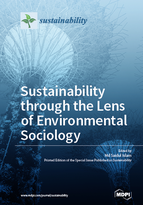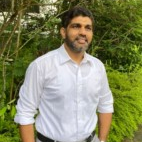Sustainability through the Lens of Environmental Sociology
A special issue of Sustainability (ISSN 2071-1050).
Deadline for manuscript submissions: closed (29 February 2016) | Viewed by 110419
Special Issue Editor
Interests: environmental sociology; international development; food and global aquaculture
Special Issues, Collections and Topics in MDPI journals
Special Issue Information
Dear Colleagues,
Our planet is undergoing radical environmental and social changes. Sustainability has now been put into question by, for example, our consumption patterns, loss of biodiversity, depletion of resources, and exploitative power relations. With apparent ecological and social limits to globalization and development, current levels of consumption are known to be unsustainable, inequitable, and inaccessible to the majority of humans. Understanding and achieving sustainability is a crucial matter at a time when our planet is in peril—environmentally, economically, socially, and politically. Since its official inception in the 1970s, environmental sociology has provided a powerful lens to understanding the challenges, possibilities, and modes of sustainability.
This Special Issue of Sustainability will provide an environmental sociology approach to understanding and achieving the widely used notion of “Sustainability.” The Special Issue will focus on, among other topics, the inherent discursive formations of environmental sociology, conceptual tools and paradoxes, competing theories and practices, and their complex implications on our society at large. We invite papers that will specifically focus on how Sustainable Development has been understood through different theoretical lenses in environmental sociology, such as ecological modernization, policy/reformist sustainable development, and critical structural approaches (such as the treadmill of production, ecological Marxism, metabolic rift theory, etc.). Also, review papers and original manuscripts may draw on how sustainable development has been practiced in, or by, various stakeholders, such as states, corporations, and local communities, for various ends, through the use of specific case studies, showing, for example, the discursive shifts, dynamic formations, and diverse contours of sustainable development.
The range of relevant topics includes:
- Environmental sociology as a field of inquiry for sustainability Historical context of sustainable development in environmental sociology
- Nature-society relationship in environmental sociology
- Theories/approaches to sustainability discourse in environmental sociology
- Environmentalism/environmental movements for sustainability
- Empirical cases (such as climate change, biodiversity, food, certification, etc.) through the lens of environmental sociology
Dr. Md Saidul Islam
Guest Editor
Manuscript Submission Information
Manuscripts should be submitted online at www.mdpi.com by registering and logging in to this website. Once you are registered, click here to go to the submission form. Manuscripts can be submitted until the deadline. All submissions that pass pre-check are peer-reviewed. Accepted papers will be published continuously in the journal (as soon as accepted) and will be listed together on the special issue website. Research articles, review articles as well as short communications are invited. For planned papers, a title and short abstract (about 100 words) can be sent to the Editorial Office for announcement on this website.
Submitted manuscripts should not have been published previously, nor be under consideration for publication elsewhere (except conference proceedings papers). All manuscripts are thoroughly refereed through a single-blind peer-review process. A guide for authors and other relevant information for submission of manuscripts is available on the Instructions for Authors page. Sustainability is an international peer-reviewed open access semimonthly journal published by MDPI.
Please visit the Instructions for Authors page before submitting a manuscript. The Article Processing Charge (APC) for publication in this open access journal is 2400 CHF (Swiss Francs). Submitted papers should be well formatted and use good English. Authors may use MDPI's English editing service prior to publication or during author revisions.
References:
- Brulle, Robert J. and J. Craig Jenkins. 2006. "Spinning Our Way to Sustainability?" Organization and Environment 19:82-87.
- Estes, R. J. “Toward Sustainable Development: From Theory to Praxis.” Available online at: http://www.sp2.upenn.edu/restes/Estes%20Papers/Toward%20Sustainable%20Development_1993.pdf
- Gould, K.A. and Tammy L. Lewis. 2009. “The paradoxes of sustainable development” in Gould, K.A. and Tammy L. Lewis (eds), pp. 269-289. Twenty Lessons in Environmental Sociology. New York: Oxford University Press.
- Lele, S. M. 2004. “Sustainable Development: A Critical Review” in Conca, K. and G. D. Debalko (eds). Pp. 252-264. Green Planet Blues: Environemntal Politics from Stockholm to Johannesburg. Boulder: Westview Press.
- Catton, William and Riley Dunlap. 1980. A New Ecological Paradigm for a Post-Exuberant Sociology American Behavioral Scientist 24 15-47
- Dunlap, Riley 1980 Paradigmatic Change in Social Science: From Human Exemptionalism to an Ecological Paradigm American Behavioral Scientist 24 5-14
- Cohen, Maurie. 1997. "Risk Society and Ecological Modernisation." Futures 29:105-119.
- Mol, Arthur. 1996. "Ecological Modernisation and Institutional Reflexivity: Environmental Reform in the Late Modern Age." Environmental Politics 5:302-323.
- Mol, Arthur and David Sonnenfeld. 2000. "Ecological Modernization: An Introduction." Environmental Politics 9:3-14.
- Alexander, Jeffery. 1996. "Reflexive Modernization: Politics, Tradition and Aesthetics in the Modern Social Order." Theory, Culture and Society 13:133-138.
- Bell, Michael Mayerfeld. 2004. An Invitation to Environmental Sociology. Thousand Oaks, CA: Pine Forge Press
- Brand, Karl-Werner. 1997. "Environmental Consciousness and Behavior: The Greening of Lifestyles." Pp. 204-217 in International Handbook of Environmental Sociology, edited by M. Redcliff and G. Woodgate. Northampton, MA: Edward Elgar Publishing.
- Dunlap, Riley and Robert Jones. 2002. "Environmental Concern: Conceptual and Measurement Issues." Pp. 482-524 in Handbook of Environmental Sociology, edited by R. Dunlap and W. Michelson. CT: Greenwood Press.
- Schahn, Joachim and Erwin Holzer. 1900. "Studies of Individual Environmental Concern: The Role of Knowledge, Gender and Background Variables." Environment and Behavior 22:767-786.
- Kalof, Linda, Thomas Dietz and Gregory Guagnano. 2002. "Race, Gender and Environmentalism: The Atypical Values and Beliefs of White Men." Race, Class, Gender 9:1-19.
- Mertig, Angela and Riley Dunlap. 2001. "Environmentalism, New Social Movements, and the New Class: A Cross-National Investigation." Rural Sociology 66:113-136.
- Hunter, Lori and Joan Brehm. 2004. "Qualitative Insight into Public Knowledge of, and Concern with, Biodiversity." Human Ecology Review 11:13-26.
Keywords
- Environmentalism
- Environmental Sociology
- Ecological modernization
- Treadmill of production
- Sustainable food
- Green movement
- New Ecological Paradigm
- Environmental Governmentality






